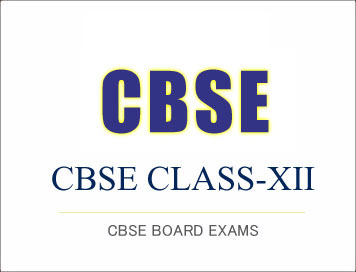CBSE Class-12 Syllabus 2018-19 (Physics)
Disclaimer: This website is NOT associated with CBSE, for official website of CBSE visit - www.cbse.gov.in
CBSE Class-12 Syllabus 2018-19 (Physics)
Senior Secondary stage of school education is a stage of transition from general education to discipline-based focus on curriculum. The present updated syllabus keeps in view the rigour and depth of disciplinary approach as well as the comprehension level of learners. Due care has also been taken that the syllabus is comparable to the international standards. Salient features of the syllabus include:
- Emphasis on basic conceptual understanding of the content.
- Emphasis on use of SI units, symbols, nomenclature of physical quantities and formulations as per international standards.
- Providing logical sequencing of units of the subject matter and proper placement of concepts with their linkage for better learning.
- Reducing the curriculum load by eliminating overlapping of concepts/content within the discipline and other disciplines.
- Promotion of process-skills, problem-solving abilities and applications of Physics concepts.
Besides, the syllabus also attempts to
- strengthen the concepts developed at the secondary stage to provide firm foundation for further learning in the subject.
- expose the learners to different processes used in Physics-related industrial and technological applications.
- develop process-skills and experimental, observational, manipulative, decision making and investigatory skills in the learners.
- promote problem solving abilities and creative thinking in learners.
- develop conceptual competence in the learners and make them realize and appreciate the interface of Physics with other disciplines.
CLASS XII (2018-19)
(THEORY)
Time: 3 hrs.
Max Marks: 70
|
|
|
No. of Periods |
Marks |
|
Unit–I |
Electrostatics |
22 |
15 |
|
|
Chapter–1: Electric Charges and Fields |
||
|
|
Chapter–2: Electrostatic Potential and Capacitance |
||
|
Unit-II |
Current Electricity |
20 |
|
|
|
Chapter–3: Current Electricity |
||
|
Unit-III |
Magnetic Effects of Current and Magnetism |
22 |
16 |
|
|
Chapter–4: Moving Charges and Magnetism |
||
|
|
Chapter–5: Magnetism and Matter |
||
|
Unit-IV |
Electromagnetic Induction and Alternating Currents |
20 |
|
|
|
Chapter–6: Electromagnetic Induction |
||
|
|
Chapter–7: Alternating Current |
||
|
Unit–V |
Electromagnetic Waves |
04 |
17 |
|
|
Chapter–8: Electromagnetic Waves |
||
|
Unit–VI |
Optics |
25 |
|
|
|
Chapter–9: Ray Optics and Optical Instruments |
||
|
|
Chapter–10: Wave Optics |
||
|
Unit–VII |
Dual Nature of Radiation and Matter |
08 |
10 |
|
|
Chapter–11: Dual Nature of Radiation and Matter |
||
|
Unit–VIII |
Atoms and Nuclei |
14 |
|
|
|
Chapter–12: Atoms |
||
|
|
Chapter–13: Nuclei |
||
|
Unit–IX |
Electronic Devices |
15 |
12 |
|
|
Chapter–14: Semiconductor Electronics: Materials, Devices and Simple Circuits |
||
|
Unit–X |
Communication Systems |
10 |
|
|
|
Chapter–15: Communication Systems |
||
|
Total |
160 |
70 |
|
Click Here To Download Full Syllabus
Courtesy: CBSE
